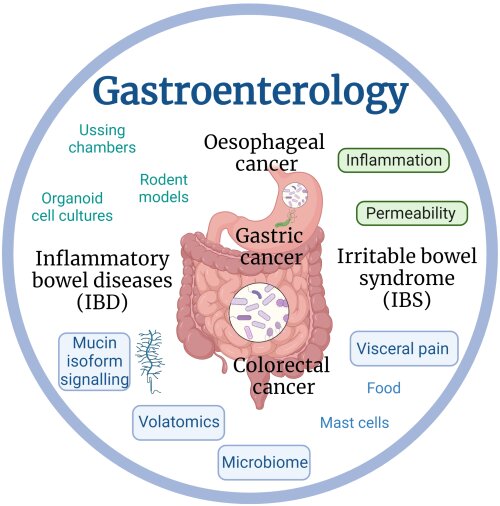
Main research topics of the laboratory of Gastroenterology:
IBD and IBS: visceral hypersensitivity
Two of the most important and frequent pathologies in the field of gastroenterology are irritable bowel syndrome (IBS) and inflammatory bowel diseases (IBD) such as Crohn’s disease and ulcerative colitis. Visceral hypersensitivity, disturbed intestinal motor function and psychological aspects have been identified as important contributors. Treatment is clinically challenging.
We employ different animal models of acute and chronic colitis to study the mechanisms of colitis-induced visceral hypersensitivity, in the acute phase of colitis and in the remission phase when inflammation has subsided while gut abnormalities continue to exist. In rat and mouse TNBS and DSS colitis and ileitis models, visceral sensitivity disturbances and the role of several mediators and receptors involved (histamine, vanilloids, cytokines, proteases...) are investigated.
IBD and immunological-mediated therapies
In a TNBS and a chronic colitis transfer model for IBD we investigate the pathways leading to iinflammation and investigate the therapetic potential of newly developed compounds. We specifically focus on the role of T-cells and inflammatory cytokines such as TNFα, IL6 and IL17.
The mucin isoform landscape in barrier-related diseases (see also here).
We study the role of transmembrane mucins, as epithelial signalling receptors mediating barrier function and as contributors in the pathophysiology of mucosal inflammatory/infectious diseases with specific interest in mucin mRNA isoforms. While most mucin isoforms encode similar biological functions, other have the potential to alter protein function resulting in progression towards disease. Currently, the mucin mRNA isoforms implicated in mucosal barrier dysfunction, is a scientific field to discover.
Sepsis and septic ileus
Sepsis is the leading cause of death in critically ill patients but clinical sepsis trials have a long history of failure. A novel treatment approach is based on inclusion of patients taking into account the immune profile of the individual patient and the particular phase of sepsis they are in.
Our research focuses on the gastrointestinal (GI) tract as an important initiator of sepsis. Using different animal models (LPS and cecal ligation and puncture) and samples from septic patients, we study the immune response in the GI wall in comparison with the systemic immune reaction using flow cytometry, molecular biology, immunoassays and immunohistochemistry. Our aim is to find tissue-specific and systemic biomarkers enabling a better inclusion strategy for future clinical trials for the treatment of sepsis.
Barrett's esophagus
This research focusses on the creation of a novel human ex-vivo model of esophageal cells. This model enables us to experimentally interrogate cell which were previously inaccessible. Our primary aim will be to investigate if a potential cell of origin of Barrett's esophagus could be present in the esophageal submucosal glands. Employed techniques include: (organoid) culture; qPCR; immunohistochemistry; cell lineage tracing techniques.
PhDs and Projects
prof dr Benedicte De Winter, prof dr Sven Francque, prof dr Heiko De Schepper
PhD Nikita Hanning
Effect of modulation of the integrity of the intestinal barrier in irritable bowel syndrome - a translational approach
prof dr Heiko De Schepper, prof dr Benedicte De Winter
PhD Elias Moonen
The role of mast cells in the pathophysiology and diagnosis of IBS
prof dr Sheila Krishnadath, dr Vincent Janmaat
Barrett’s metaplasia; HOX transcription factors; Carcinogenesis; Gastroenterology; Experimental Medicine.